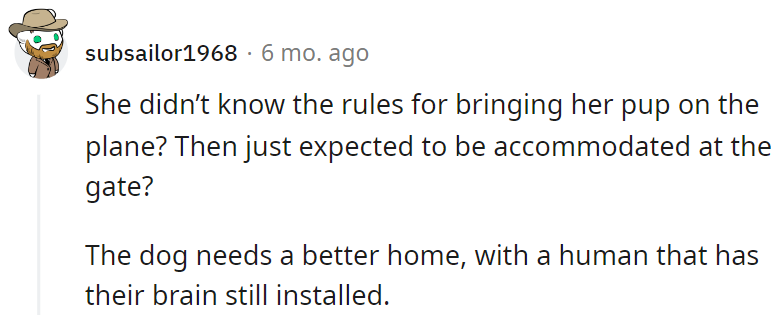Woman Ditches Beloved Bulldog At Airport And Jets Off On Vacation After Facing Strict ‘No-Dog Crate, No-Boarding’ Policy
In a tale that's as bewildering as it is heartbreaking, a French bulldog was left stranded in a Pittsburgh airport parking lot, rolling solo in a stroller.
This saga unfolded on a Friday that started like any other but quickly turned into a storyline ripe for the ‘r/facepalm’ subreddit. The internet community was ablaze, not with the light of torches, but with fiery outrage over such disregard for the poor pup's well-being.
It all started when an unidentified traveler was told she couldn't bring her dog on the plane without a crate. Faced with the ultimate travel dilemma at the gate, she desperately attempted a Hail Mary—a ploy to pass off her furry companion as an emotional support pet. The airline, however, wasn't buying it.
It finally boiled down to two unsavory options: abandon the vacation or abandon the dog. She eventually made her choice—and it wasn’t the dog.
Reddit users were shaking their heads in disbelief as they questioned this woman’s priorities. I mean, sandy beaches are great and everything, but to choose a vacation over your own pup? That’s another level of callousness.
Enter the heroes of our story, the Allegheny County Police Department. They discovered the dog at the crack of dawn, and thanks to a chip, they successfully tracked down the runaway vacationer.
The woman is set to face a slew of charges and a potential $1,000 fine for dog abandonment.
Who knew that in Pennsylvania, ditching your dog wasn’t only heartless but also wallet-draining?
This doggo was abandoned in a stroller at the airport

"Who just shows up at the airport with a bulldog? Seems like the type of thing you would look into ahead of time."

The Emotional Bond Between Pets and Owners
The bond between pets and their owners is profound and often reflects deep emotional ties. Research from the University of California suggests that pet ownership can mitigate stress and enhance feelings of companionship. However, abandoning a pet, especially under distressing circumstances, can indicate deeper psychological issues, such as avoidance or fear of responsibility.
Understanding the motivations behind such actions can provide insight into the emotional landscape of pet ownership and highlight the importance of commitment.
"Aren’t those dogs worth thousands of dollars? If so, I’m sure anyone will gladly take it."

Justice for the poor thing

Psychologists emphasize that the attachment styles developed in childhood often influence how individuals view relationships, including those with pets. A study published in the Journal of Applied Animal Welfare Science found that individuals with secure attachment styles are more likely to maintain strong bonds with their pets, while those with insecure attachments may struggle with commitment. This dynamic can lead to impulsive decisions, such as abandoning a beloved animal.
Recognizing these patterns can help individuals reflect on their relational styles and responsibilities.
'This should be an arrestable offense."

"Hopefully, the little boy is with someone who deserves him."

Addressing Issues of Commitment in Pet Ownership
Responsible pet ownership requires a commitment that should be taken seriously. Research from the American Veterinary Medical Association highlights the importance of understanding the long-term obligations that come with pet ownership. Couples considering pet adoption should engage in discussions about their readiness and willingness to commit to a pet's lifelong care.
Creating a shared vision and understanding of responsibilities can help prevent impulsive decisions that can adversely affect both the pet and the owners.
"The dog needs a better home, with a human that has their brain still installed."

"It looks so sad. People who do all that crazy dog stuff creep me out."

When it comes to pet abandonment, addressing the underlying fears or anxieties that lead to such actions is crucial. A study by Yale University found that individuals who feel overwhelmed often resort to avoidance strategies, which can manifest in the relinquishment of pets. Acknowledging these feelings and seeking support can help individuals navigate the complexities of pet ownership more effectively.
Developing coping strategies, such as stress management techniques or counseling, can empower individuals to face their responsibilities without resorting to avoidance.
"Thank god a person like this no longer owns a dog. She probably left her kid alone in the bathtub, too."

"Literally cannot imagine doing this to my Frenchie! They are pretty sensitive dogs."

Thankfully, the dog was whisked away to an animal shelter, ensuring he was safe and sound. As for his (ex) owner, her vacation likely took a turn for the "ruff," a reminder that pets are for life, not just for Christmas—or abandoning for flights.
And who knows? Maybe Monsieur Frenchie's adventure is only just beginning. Here’s to hoping our French bulldog friend finds a forever home that truly understands the meaning of loyalty and love.
We'd love to get your thoughts on this story. Join the conversation in the comments.
"A French bulldog is around $3000. What the hell were they thinking?"

'I can’t fathom being this cruel to my little princess. This would break her little heart."

Authorities tracked and identified her through the dog chip

Psychological Analysis
This situation illustrates the complexities of pet ownership, where emotional bonds can be tested by external pressures. It's essential for individuals to recognize the importance of commitment in these relationships and to confront any fears that may lead to impulsive decisions. Understanding the responsibilities associated with pet ownership can enhance the overall experience for both pets and their owners.
Analysis generated by AI
Analysis & Alternative Approaches
In conclusion, the emotional bond between pets and their owners is significant and requires a commitment to lifelong care. Understanding the psychological factors that influence pet ownership can help individuals make more informed decisions. By fostering a sense of responsibility and addressing underlying fears, pet owners can build stronger, more fulfilling relationships with their animals.



